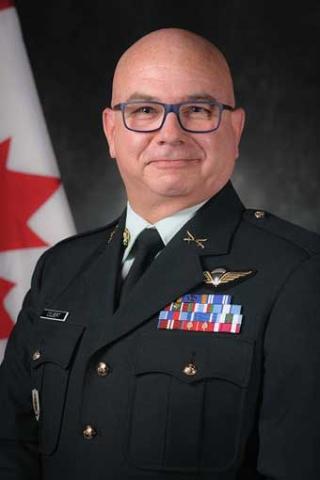
Joined
1984
Postings
- 1984-1986: 5 Canadian Light Artillery Regiment, Victoria, BC
- 1986-1991 : 1 Commando, Canadian Airborne Regiment, Petawawa, ON
- 1991-1996 : Canadian Airborne Centre, Edmonton, AB
- 1996-2005: 3 Battalion, Royal 22 Regiment, Valcartier, QC
- 2005-2011: Royal Military College, Kingston, ON
- 2011-2013: 3 Battalion, Royal 22 Regiment, Valcartier, QC
- 2013-2015: Canadian Manœuvre Training Centre, Wainwright, AB
- 2015-2017: CWO of the Canadian Forces Health Services Group, Ottawa, ON
- 2017-2019: Military Personnel Command, Ottawa, ON
- 2019-today: Vice Chief of the Defense Staff C-SEL, Ottawa, ON
Deployments
- 1986-1987: Cyprus
- 1992-1996: Freefall instructor and Sky Hawks demonstration team
- 1997: Haiti, OP STABLE
- 1999: East Timor, OP TOUCAN
- 2001: Bosnia
- 2004: Afghanistan
- 2012: Afghanistan, OP ATTENTION
Originally from the Québec city area, Major Martin Colbert discovered a liking for the military at a young age when he joined Army Cadets. Appreciating the structure, team spirit and adventures experienced with the Cadets, he made the leap to the CAF in 1984, at the age of 18.
After two years as a gunner, he switched lanes and began a long career as a parachutist where he touched on almost all the aspects of the trade. “I took every kind of course. Basic and advanced parachuting. I did my freefall training. I was a freefall instructor (...) a large part of my career was geared toward airborne forces and everything concerning parachuting within the infantry.”
“Personally, the first time I heard of East Timor was through the news in early September covering what was going on over there.”
In 1986, he went abroad for the first time, taking part in Canada’s peacekeeping efforts in Cyprus. That was only the beginning, as he went overseas six times during his career. It was in 1999, not long after coming home from a mission in Haiti, that like many Canadians, he would learn through the media of rising tensions in the eastern part of an island called Timor. Brought on by an independence referendum, these tensions were serious enough that the international community decided to intervene.
“Personally, the first time I heard of East Timor was through the news in early September covering what was going on over there. Not long after, we saw rapid developments in terms of the United Nation’s intention to form a force (…) Eventually, Canada decided to become militarily involved.”
Under the Australian forces’ leadership, some hundreds of Canadian soldiers landed on the Pacific island, which is close to Australia and Indonesia. The situation on the ground was not pretty. “When we got there, we immediately started to patrol. Anti-independence militias had put the Australian forces to the test, but they quickly fell back in the face of professional and structured forces.”
“It was also our responsibility to establish conditions so that the villagers could return to their villages.”
The mission in East Timor was conducted under Chapter VII of the United Nations Charter. The foreign forces present had a mandate to restore peace. A large part of the population had taken refuge in the mountains. The Canadians also had to help re-establish the Timorese’s confidence.

Members of the 3rd Battalion of the Royal 22e Régiment which Martin Colbert was part of in front of their camp in East Timor
“It was also our duty to establish conditions so that the villagers could return to their villages. It’s not easy when there were a lot of massacres and you have fled. And basically, you don’t have a house anymore.”
Based on his observations, numerous citizens had been forced by anti-independence militias to set fire to neighbouring houses or kill certain members of neighbouring families to save theirs. UN forces on the ground then had the hefty job of re-establishing the confidence of wary citizens who sometimes wanted to avenge their losses.
After six months as an infantry platoon 2IC in austere conditions, he returned to Canada. “We still managed to create a certain stability, which was a good foundation to help the Timorese return to a more normal life.” He would hold multiple roles in the CAF and went to Bosnia in 2001. He was then deployed twice to Afghanistan.
Since July 2019, he has served as the Chief Warrant Officer to the Vice Chief of the Defence Staff in Ottawa. After decades in the CAF, he does not plan on stopping. “I’d like to give back to the youth. So my career plan is to transfer to the Cadet Program.”
When asked if he would make the same life decisions again, he candidly responded, “I have had a really wonderful career. You only live once. If I had my life to live over, I’d for sure do the same all over again.”
In July of 2022, Martin Colbert was promoted to the rank of Major and began work with the development of Non-Commissioned Officer (NCO) education.
With courage, loyalty and integrity, Martin Colbert has left his mark. Discover more stories.
You can also stream his Faces of Freedom Podcast episode.